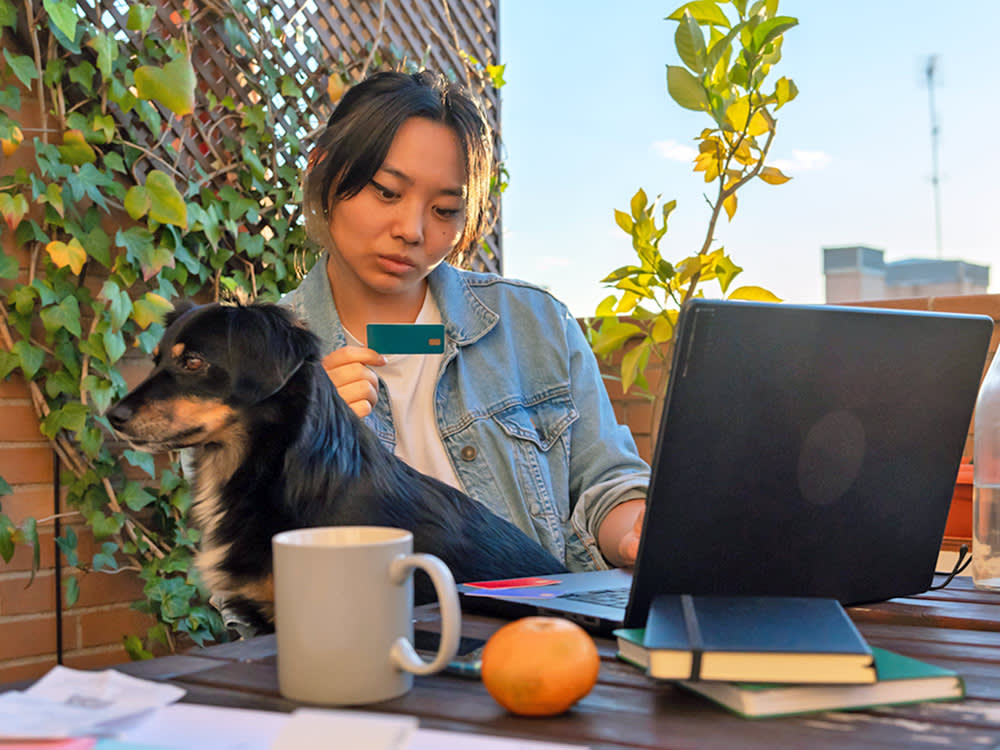This is Your Sign to Get Your Dog a Bank Account
Prepping for their future is your responsibility

Share Article
Your dog is more than just a pet, they’re an important member of your family. And like any family member, they come with expenses – some planned, others that decide to sneak up on you on the last Tuesday before payday.
As a dog behaviourist, I know that the majority of my clients take out pet insurance for medical challenges their dog may face – it‘s the smart thing to do to make sure that you don’t find yourself in the position of worrying about cash when your dog‘s health is in jeopardy, especially as they get older and their needs get more complicated. But I’d also encourage you to consider setting up a dedicated dog savings account.

littleKin™ is Kinship’s home just for puppy and kitten parents. Bop over to check out expert advice, new pet tools, and special deals—all curated for your newest family member.
opens in a new tabHaving a pot of money to dip into – whether for unexpected challenges or for fun stuff – makes financial sense and ensures you’re always prepared. It’s a practical way to plan for vet bills as your dog gets older, training sessions to help you guys grow together, or even spontaneous adventures like a dog-friendly holidayopens in a new tab. And, most importantly, it can take some of the stress out of being a pet parent. After all, you‘ve got enough to worry about without wondering where the cash to pay for your dog‘s sock gobbling adventure should come from.
The hidden costs of dog parenting
When most people think about the cost of life with a dogopens in a new tab, they factor in food, toys, and the occasional vet visit. But in reality, the expenses can go far beyond that and insurance won’t cover everything. Let’s take a quick look at some of the hidden costs of a life well-lived, with dogs.
Insurance shortfalls
Did you know that some insurance policies don’t cover basic physical needs, such as dental careopens in a new tab? They may not cover pre-exisiting conditions (meaning it’ll be tough to swap policies when your premiums increase), behavioural support, or alternative treatments such as massage or hydrotherapy which could provide valuable pain relief to your dog as they get older and encounter more health issues. While researching a good policy is vital, it’s also important to note that the excess you pay (the amount you must pay out of pocket before your insurance company covers the rest) will increase as your dog ages, so putting a small amount in savings each month to cover this while your dog is young will pay off in their senior years.
Special diets
If your dog develops any gut issues – be it pancreatitis, food allergies, or anxiety related problems – you may need to change the food you’re feeding your dog. Whether that means feeding a prescription diet or getting the support of a canine nutritionist to guide you through what‘s best for your dog’s gut, this will come at a cost.
Travel
One of the best things about living with a dog is the adventures you can take together. Whether that’s exploring a new local walk or the exciting opportunity to travel together – you’ll want to make the most of any chance you can to make memories together. If you’re taking your dog abroad, not only will they need certain vaccinations or worm treatment before you travel – you may need to have an Animal Health Certificateopens in a new tab (UK) or a Health Certificate (US). Add in pet-friendly travel and accommodation and the costs can rise quickly.
Behavioural issues
And, while we all hope to have a relaxed and happy dog, life changes, previous experiences, illness or pain can lead to behavioural challenges. You may need support from an ethical canine behaviourist to guide you through re-building your dog’s confidence. While training issues, such as poor recall, can be fixed fairly quickly – more complex behavioural challenges, such as separation anxiety or reactive responses to other dogs or people, will require a longer period of support. This can come at a cost and not all insurance providers will cover your behaviourist’s time.
Changes to your circumstances
If you lose your job, need to move home, or have a family emergency, having a financial buffer within your doggy bank account can help reduce stress, as you know you’ve enough money there to cover any financial shortfall.
And of course, it’s not just about covering their basic needs – you want your dog to live their best life. That might be something like treating them to a new toy, going to an agility or scentwork class, a dog-friendly cake on their birthday or a new comfy bed. Their savings account doesn’t just have to be for challenges – it can be for celebrations too.
How much should you save?
There’s no one-size-fits-all answer, as individual financial situations vary. What‘s affordable to one pet parent might look very different to another pet parent and whatever money you can put away – no matter how small the amount – will be helpful in an emergency. The most important thing you can do is just to start saving. Using a digital bank account can make it easy to track your contributions, ensuring you’re always saving something, no matter how small.
Don’t worry if you can’t save up large amounts each month, the key is to get started – even if it’s just a few contributions whenever you can. The reality is, most health conditions come into play when a dog is older, so the earlier you start, the more you‘ll have when your dog reaches their senior years.
Some bank apps allow you to round up your usual purchases and put the extra pence or cents into a savings pot automatically for you, which is a really good way to save without even noticing.
Peace of mind
The reality is that as dogs age their needs change. Veterinary costs tend to increase, and the more financial flexibility you have, the more you can focus on giving your dog the best possible quality of life rather than worrying about expenses.
By having a dedicated savings account for your dog, you’re ensuring that no matter what happens, you’ll be in the best position to take care of them without financial stress.

Caroline Wilkinson
Caroline Wilkinson is a Certified Animal Behaviourist. As the Founder of digital pet coaching service Barket Place, Caroline has a passion for improving connections between human and hound, with a focus on relationships and reduction of stress for canines living in a human world.
Related articles
![cat in red bow tie being held up by hand]() opens in a new tab
opens in a new tab8 Things You Needn’t Splurge On For Your Pet (If You Don’t Want To)
If you don’t buy these things for your beloved cat or dog, you’re not a bad pet parent
![a woman with curly hair smiles down at her daschund]() opens in a new tab
opens in a new tabHow Much Does it Cost to Have a Dog?
We got our paws on a calculator and did the research so you don’t have to
- opens in a new tab
What Are The Different Types Of Pet Insurance?
Everything you need to know about how pet insurance works in the UK
![puppy chewing a red toy]() opens in a new tab
opens in a new tabNew Puppy Essentials: Everything You Need
We’ve thought of everything, so you don’t have to



